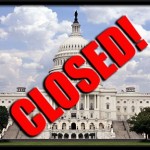President Barack Obama had every reason to stay in Washington when he cancelled a crucial trade trip to Asia earlier this month. It was what everybody inside the Beltway expected him to do in the face of a nasty political crisis at home.
Yet had he gone to the APEC summit he would have sent a powerful message to Congress as well as to America’s allies and investors overseas. The president was improbably caught between the ambitions of China’s Communist Party leadership and tantrums by America’s most anarchic-minded politicians.

Asia’s nations need the personal reassurance that the U.S. is economically, militarily and politically committed to supporting a historic rise in Pacific prosperity that mutually benefits America. That kind of touch can only come from the top. Moreover, Japan and China together hold more than $2 trillion in U.S. debt – for now. Their view on the long-term value of what should be the world’s safest investment has ramifications throughout the financial markets and at central banks around the world. This is one of those times when President Obama has to try and think more like a corporate executive trying to manage his board of directors than a politician who thinks he can outsmart his most irrational foes.
As Congress day by day packs the Capitol with more and more kindling in order to set the U.S. political and global economic system ablaze, President Obama could have gone to Asia and shown lawmakers that he would take risks to head off the strategic threat posed by the fight over the debt ceiling. Instead, the White House’s campaign of fighting hour-by-hour skirmishes with disorganized bands of lawmakers has left the country confused and increasingly fearful about the future.
Just as in the bond market, the American political system is supposed to be the reliable one, not a flimsy house of wild cards.
That is no longer the case. Whether the debt ceiling is indeed raised, or the country’s debt rating is downgraded further by Standard & Poor’s or retiree Social Security checks are late, or absent, next month remains to be seen. It is all part of a larger strategic issue: the further decline of American competitiveness. There will be more crises to come.
America is losing its ability to lead globally on the strength of its actions and ideas, to support a vibrant free-market system, to nurture a responsive democratic political system and to uphold a social contract that honors economic and social progress for its citizens. The business climate, America’s infrastructure, the national debt level, the defense industrial base, the market and immigration policy all show signs of political-battle damage. Pacific nations are keenly aware and are looking between Beijing and Washington for signs of initiative and leadership in Asia.
The last month has done great harm at home and abroad to confidence in this country. It will take the better part of the next decade to repair. In the near term, when it comes time to start to look for renewed signs of confidence, most observers will be cued in to the halls of Congress or the Oval Office. But the place to watch is across the Pacific. The White House needs to keep this in mind as it considers its next moves with Congress — and with Beijing.
The post Debt fight reveals America’s strategic vulnerabilities appeared first on American Security Project.


